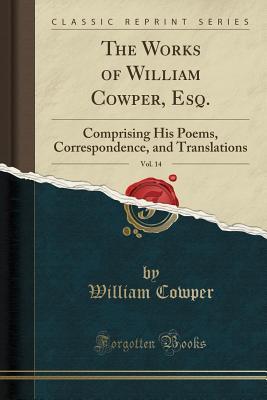- Bible
- Read the Bible
- Bible Versions
- Verse of the Day
- Reading Plans
- Verses by Topic
- Books of the Bible
- Bible Images
- Study
- Commentaries
- Concordances
- Dictionaries
- Encyclopedias
- Sermons
- Bible Atlas & Maps
- BP Wiki
- Devotionals
- Today's Devotionals
- Light of the World
- All Devotionals
- Inspirational Quotes
- More
- Picture Quotes
- Videos
- Inspirational
- Bible Study
- What The Bible Says
- Bible Q&As
- Daily Bread
- Bible by Genre
- Bible Stories
- Random Bible Verse
- Community
- Store
The Works of William Cowper, Esq., Vol. 14: Comprising His Poems, Correspondence, and Translations (Classic Reprint)
by William Cowper
Excerpt from The Works of William Cowper, Esq., Vol. 14: Comprising His Poems, Correspondence, and Translations
So saying, the Hero through the palace-gate Issued, whom, by Alcinous' command, The royal herald to his vessel led.
About the Publisher
Forgotten Books publishes hundreds of thousands of rare and classic books. Find more at www.forgottenbooks.comwww.forgottenbooks.com
This book is a reproduction of an important historical work. Forgotten Books uses state-of-the-art technology to digitally reconstruct the work, preserving the original format whilst repairing imperfections present in the aged copy. In rare cases, an imperfection in the original, such as a blemish or missing page, may be replicated in our edition. We do, however, repair the vast majority of imperfections successfully; any imperfections that remain are intentionally left to preserve the state of such historical works.
So saying, the Hero through the palace-gate Issued, whom, by Alcinous' command, The royal herald to his vessel led.
About the Publisher
Forgotten Books publishes hundreds of thousands of rare and classic books. Find more at www.forgottenbooks.comwww.forgottenbooks.com
This book is a reproduction of an important historical work. Forgotten Books uses state-of-the-art technology to digitally reconstruct the work, preserving the original format whilst repairing imperfections present in the aged copy. In rare cases, an imperfection in the original, such as a blemish or missing page, may be replicated in our edition. We do, however, repair the vast majority of imperfections successfully; any imperfections that remain are intentionally left to preserve the state of such historical works.
BUY NOW
Paperback, 310 pages
Published January 27th 2019 by Forgotten Books
© 2025 Bibleportal.com All rights reserved.

William Cowper was an English poet and hymnodist. One of the most popular poets of his time, Cowper changed the direction of 18th century nature poetry by writing of everyday life and scenes of the English countryside. In many ways, he was one of the forerunners of Romantic poetry. Samuel Taylor Coleridge called him "the best modern poet", whilst William Wordsworth particularly admired his poem 'Yardley-Oak'.
Cowper suffered from severe manic depression, and although he found refuge in a fervent evangelical Christianity, the inspiration behind his much-loved hymns, he often experienced doubt and feared that he was doomed to eternal damnation. His religious sentiment and association with John Newton (who wrote the hymn "Amazing Grace") led to much of the poetry for which he is best remembered.
William Cowper was an English poet and hymnodist. One of the most popular poets of his time, Cowper changed the direction of 18th century nature poetry by writing of everyday life and scenes of the English countryside.
He was born in Berkhamsted, Hertfordshire, England. After education at Westminster School, he was articled to Mr. Chapman, solicitor, of Ely Place, Holborn, in order to be trained for a career in law.
Later he settled at Huntingdon with a retired clergyman named Morley Unwin and his wife Mary. Cowper grew to be on such good terms with the Unwin family that he went to live in their house, and moved with them to Olney, where John Newton, a former slave trader who had repented and devoted his life to the gospel, was curate. At Olney, Newton invited Cowper to contribute to a hymnbook that Newton was compiling. The resulting volume known as Olney Hymns was not published until 1779 but includes hymns such as "Praise for the Fountain Opened" (beginning "There is a fountain fill'd with blood") and "Light Shining out of Darkness" (beginning "God moves in a mysterious way") which remain some of Cowper's most familiar verses. Several of Cowper's hymns, as well as others originally published in the "Olney Hymns," are today preserved in the Sacred Harp.
Cowper was seized with dropsy in the spring of 1800 and died in East Dereham, Norfolk.
... Show more